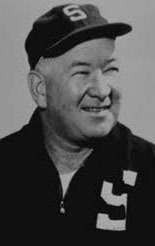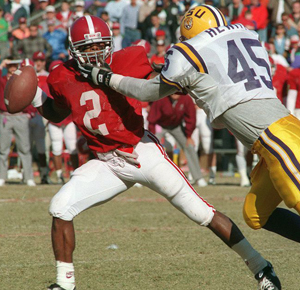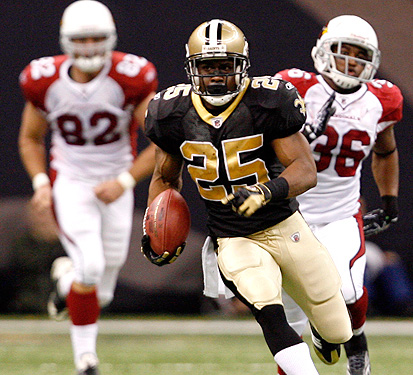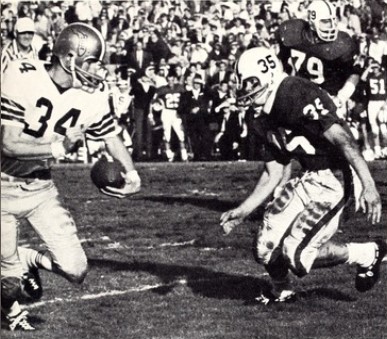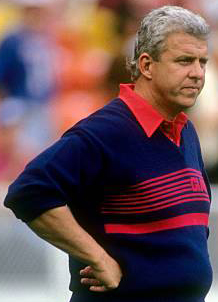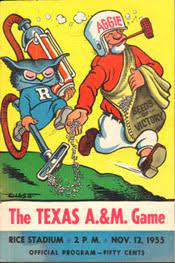Flying Success
More Strange But True Football Stories, Zander Hollander (1973)
"What, let my team fly to a football game? Never!" The speaker was University of New Mexico coach Roy Johnson. He was talking to sportswriters from the Albuquerque newspapers about an invitation to play Occidental College in California.
Today, football teams fly all the time. But Roy Johnson was talking in 1929. Only two years before, Charles Lindbergh had made the first solo flight across the Atlantic. There were no airlines as we know them now and, of course, the jet engine had not yet been invented. If Johnson's New Mexico team flew to California, they would fly in rickety planes that held only eleven passengers. No wonder he said no. No college team had ever flown to a football game before, the coach said, and he didn't want his Lobos to be the first.
1929 New Mexico Lobos
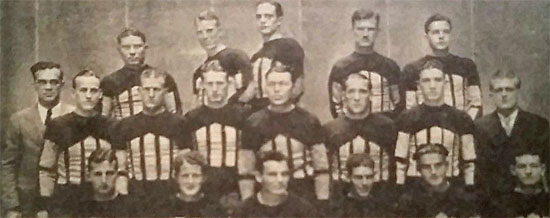
Coach Roy Johnson is at the far left.
The town of Albuquerque, which then had about 15,000 people, was in the midst of "air fever." Situated in the middle of the Great Southwest, the little city was hundreds of miles from any major population centers. So adventurous citizens began traveling by plane rather than spending dozens of hours on trains or driving for days on hazardous roads.
Transcontinental Air Transport, known as T.A.T., was an early flying organization founded by Charles Lindbergh himself. T.A.T. advertised flights across the United States, but they were not really transcontinental, since the passengers flew only during the daylight hours, then traveled in trains after dark. Still, the coast-to-coast trip took only 48 hours.
The last leg of the coast-to-coast flight was from Albuquerque to Los Angeles. T.A.T. had suggested to Roy Johnson that the University of New Mexico football team fly to their game to help promote air travel. The trip would take 26 hours by train, they said. By plan it would take only eight. But still Johnson said no.
The people of Albuquerque were upset by his refusal. Some even demanded that the team be allowed to fly. Finally, five days before the game, Johnson yielded to public pressure and said the Lobos would become the first team to fly to a football game.
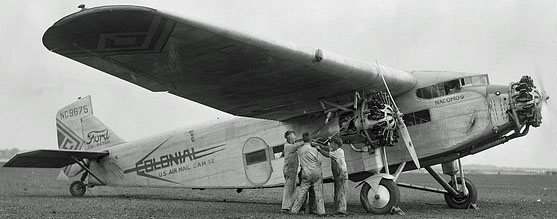
1929 Passenger Airplane
Johnson made two conditions. First, each player had to bring a note from his parents giving permission for the flight. Secondly, only the substitutes and assistant coaches would fly to the game while the first-string players would take the train. On the way back the first-string players could fly. If there were any delays or accidents on the way to California, at least the regular players would arrive safely by train. There were only six seats available on the regular plane from Albuquerque to Los Angeles. And when the airline added another plane, this provided only 11 more seats. So there was no way that the entire 30-man team could fly together anyway.
The 14 first-string players boarded the train at 3:45 A.M. on Thursday. They would arrive in Pasadena early Friday morning, the day of the game. The rest of the team took off by plane shortly after 10 A.M. Thursday and were in their hotel rooms in Pasadena before sundown. They even had a chance to work out under the floodlights in the new Rose Bowl, where the game would be played Friday night. Night football was also new to the Lobos. Their field in Albuquerque had only recently been planted with grass, and it certainly was not equipoped with electric lights.
The huge Rose Bowl, which could hold 100,000 fans, was hardly filled for the game. The crowd was estimated at 17,000, however, more than the entire population of Albuquerque. The New Mexico starters were tired from the long train trip. In addition, they had never played before an audience of this size and had never played at night under the lights. ...
The teams were using a white football, thinking that it would be easier to see at night. But the Occidental players were wearing white home uniforms, and the New Mexico players found it almost impossible to detect the white ball against the white jerseys.
New Mexico, perhaps inspired by the plane flight, used an aerial attack but not very successfully. At the half, they had fallen behind by 13-0.
The half-time show was a spectacular fireworks display featuring a giant sign reading "Welcome Lobos" and a Lobo (wolf) which wagged its fiery tail and spewed flames from its mouth.
Perhaps the New Mexico players were dazzled by the light show during the intermission. Whatever the reason, they were held scoreless again in the second half and lost 26-0.
The next morning the Lobo regulars boarded a T.A.T. plan and flew back to Albuquerque. The second team had been the first to fly to a football game - now the regulars were the first to fly home. Although the trip was a football failure, it was a flying success and a flying first for the Lobos of New Mexico.
